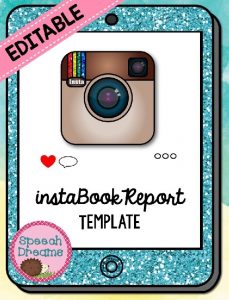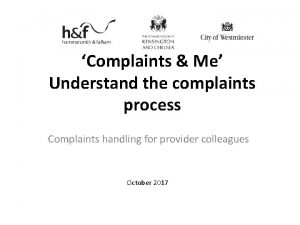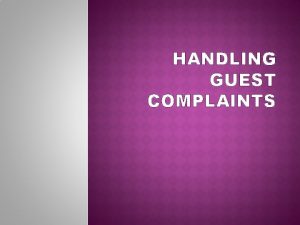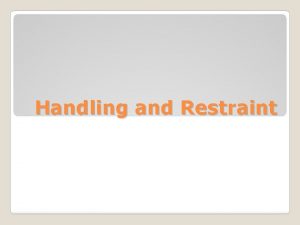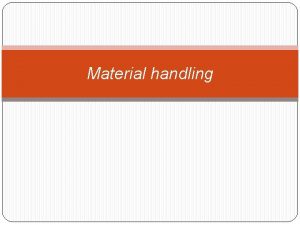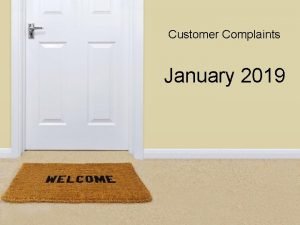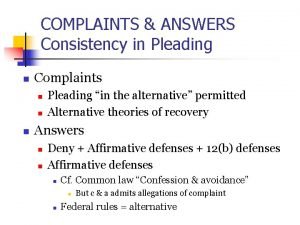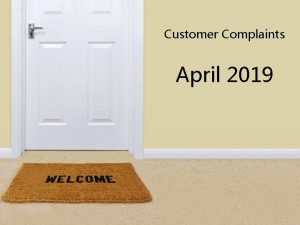Handling Complaints Complaints Why do people complain Not





















- Slides: 21

Handling Complaints

Complaints Why do people complain? ◦ ◦ ◦ ◦ Not satisfied with service or products Expectations not met Poor quality service of product Mistakes made Having a bad day Seeking compensation Some people just like to complain. ◦ Does it matter why people complain? ◦ Does this change how we deal with their complaints?

You should… • • Always be polite (try to use the guest’s name) Always stay calm Try to put yourself in the position of the guest Always apologise (even if its not your fault) Always try to offer some solution or alternative Indicate how long it will take to resolve the problem Thank the guest for their feedback Follow up with the guest

You Shouldn’t… • • Get angry or impatient Interrupt Take the complaint personally Make excuses for the problem Ignore the problem Blame someone else Promise something you can’t deliver

Active listening Stop talking Suspend judgment (keep an open mind) Do not interrupt Be ready to listen to content Observe body movements Observe behaviours Use appropriate body language

Handling complaints face to face 6 -Steps Apologize Clarify (if necessary) Empathize Suggest Solution and Take Action Follow up Offer (if appropriate)

Apologizing I'm sorry. . . I'm very sorry to hear that. . . I apologize. . . I sincerely apologize … I apologize for the problem. . . I apologize for the inconvenience. . . My apologies for. . . Please accept our apologies for… I regret that…

Empathizing I I understand the situation. your concerns. what you are saying. the problem. Avoid using words like ‘pity’ and ‘sad’ and avoid saying that you understand how they feel

Clarifying I’m sorry, I don’t quite understand the problem. Could you please tell me again? Could you please speak more slowly? Could you please tell me exactly what the problem is? Could you please tell me exactly what happened? I just want to clarify what the problem is. I just want to make sure I understand clearly… Note: Indirect questions are more polite

Suggest Solution and Take Action I will send someone to take care of it We will send the correct …. immediately Let me check with …. and see what happened I don't know what happened, but I will get back to you later today Let me straighten this out and I will get back to you today with the solution. May I suggest that we… I would like to propose that we… Perhaps you would like to. .

Follow Up Ms. Chen, did everything work out to your satisfaction? Mr. Wong, I wanted to see if the problem has been resolved to your satisfaction. Did everything work out okay? Did you get what you needed/wanted? Is everything to your satisfaction? Is there anything else I can do for you? I just wanted to make sure everything is OK now.

Offer To show our apologies, we would like to offer you… Please accept this complimentary meal coupon as a token of our appreciation for your valuable feedback

Other useful expressions Thank you for your patience Thank you for your understanding We appreciate your understanding Sorry to keep you waiting Would you mind changing tables / paying by credit card?

Preparing for your role play Google search “Handling complaints” to get some more useful language Search Youtube for handling complaints examples Think of a situation and write your own short dialogue using the structure and language we have discussed in class Nb. If you don’t do any preparation or practice, it will be difficult to do well as you only have a short time to get ready in class on the day!


Written response – letter structure • • • Thank the person for their letter and ensure that their feedback is valued. Address each complaint with a separate paragraph. You should not make excuses or be defensive, however you may politely offer an explanation if appropriate. Explain what you plan to do about it. Offer some special service as compensation (if appropriate)

Sender’s Address (optional) Date February 22, 2011 Receiver’s full title, name and address Salutation Dear. . . Paragraph 1 – thank the customer for their letter and note your appreciation for their feedback / apologise. Paragraph 2 – If appropriate, provide some explanation or background, relating to the reason for the complaint, however be careful not to make excuses. Paragraph 3 – Mention what action, if any, has or will be taken to fix the problem or prevent it from happening again. Paragraph 4 – If appropriate offer compensation Closing Paragraph – Re-state apology / invite return or continued business relationship. Close Yours sincerely Yours faithfully Regards

Written response - language • • Always use polite formal language. Use language that shows you are empathetic, understanding and appreciative of their concerns. Do not use defensive or aggressive language. Do not use very casual language.

Correct the mistake • I apologies for the inconvenience we made you. • I am very apologise for what happened. • I am regret that you did not enjoy your meal. • I really feel apologise for the situation. • I want to complain to the service in this hotel.

Correct the mistake • Please accept my apologise. • To show our apologise, we could like to offer you a coupon. • I’m very sorry to that. • To show our appreciate for your feedback we would like to offer you a complimentary meal. I hope everything is to your satisfied

Correct the mistake Thank your understand Could you mind to tell me again? Sorry to keep you wait
 Andreas carlsson bye bye bye
Andreas carlsson bye bye bye Formal letter to complaint
Formal letter to complaint I am writing to complain about
I am writing to complain about Wait ikinci hali
Wait ikinci hali Chief complain
Chief complain Vocabulary workshop level d unit 1
Vocabulary workshop level d unit 1 Rational persuasion adalah
Rational persuasion adalah Does the table represent a function why or why not
Does the table represent a function why or why not Does this table represent a function why or why not
Does this table represent a function why or why not Why or why not
Why or why not Dont ask
Dont ask Monica brewed espresso steamed milk
Monica brewed espresso steamed milk What are somatic complaints
What are somatic complaints Resolve hrs
Resolve hrs Nac burial fund 2020 banking details
Nac burial fund 2020 banking details Two complaints of tejanos in 1830.
Two complaints of tejanos in 1830. Epso complaints
Epso complaints Fashion world complaints
Fashion world complaints Cc hpi
Cc hpi New apostolic church burial fund
New apostolic church burial fund Chief complaint present illness
Chief complaint present illness Vimeforum
Vimeforum









